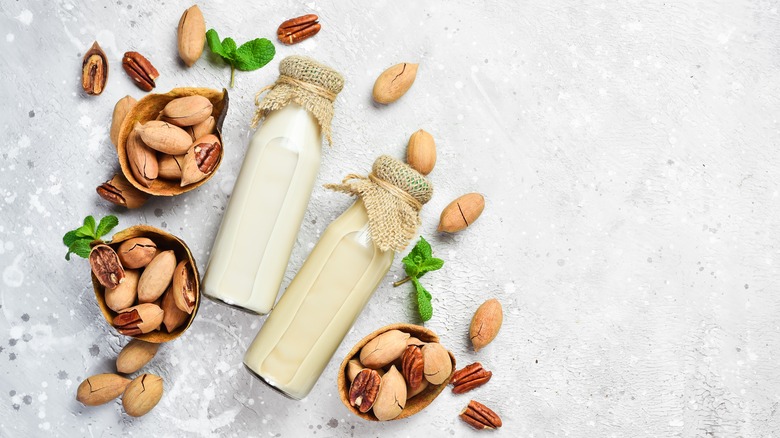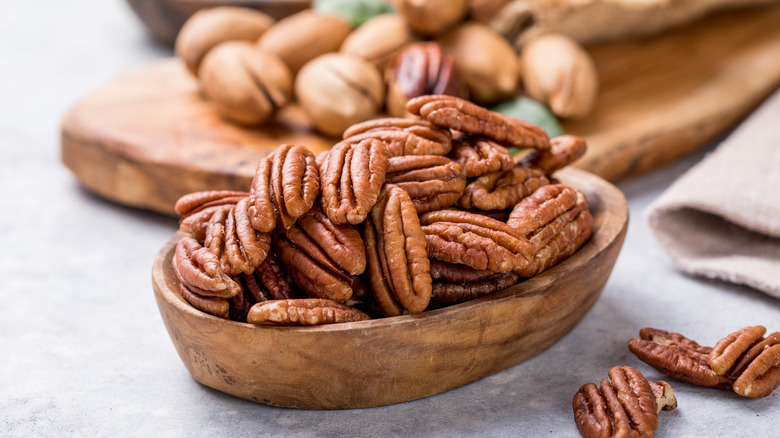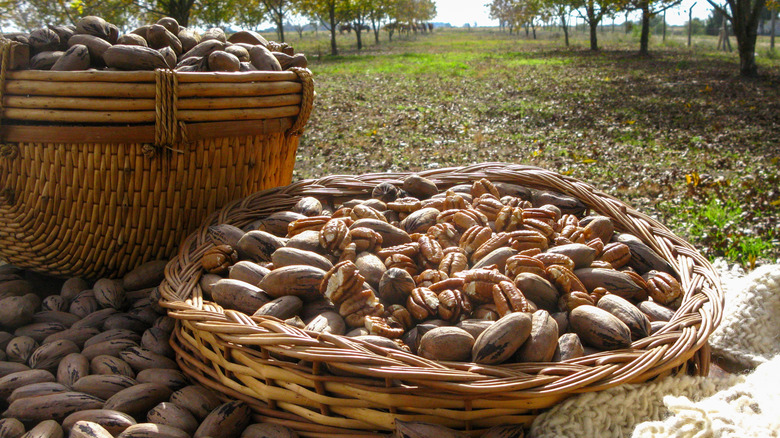What Is Pecan Milk And How Does It Compare To Other Non-Dairy Milk?
The newest wave of plant-based products has arrived, gifting us with a wide range of non-dairy items to choose from. Hemp, sesame, banana, pistachio, and even potato milk have been on the rise. But despite their assumed similarities, each has its own unique characteristics and nutritional value. Oat milk can help monitor blood sugar levels, and cashew milk is packed with magnesium to promote a healthy heart and general functioning. Pecan milk boasts its own superpowers with its high pecans-to-water ratio. In fact, it may provide more vitamins than a glass of almond milk, which has been the leading plant-based dairy product since the early 2010s.
Pecans are an outstanding source of protein, vitamins, and minerals that can help stave off high cholesterol and improve heart health. But you don't need to solely eat them by the handful to reap these benefits – you can just pour yourself a glass. One serving of pecan milk contains 14% of our daily dietary fiber and 60% of manganese to aid bone and reproductive growth. And due to the milk's lowered levels of phytic acid, these nutrients have a higher concentration than in their natural form. Phytic acid is common in many tree nuts, seeds, and legumes. It prevents our digestive system from fully garnering the pecan's full nutritional value. However, this chemical nearly disappears when soaked overnight, leaving the pecan's entire health contents intact. It also allows the consumer to digest the tree nut's nutrients at a higher and more efficient rate.
Pecan milk is a zero-waste and low-sugar alternative
One of the biggest differences between pecan milk and other plant-based dairy options is its sugar. Added sugars are a significant problem in the U.S.; nearly 17 teaspoons of sugar are consumed on average daily, despite the dietary recommendation of fewer than 12 teaspoons. Unfortunately, your sweetened almond milk harbors more sugar than you might think. One serving may have over 20 grams of sugar or 1/3 of your daily sugar intake. They can also contain processed thickeners that are an unnatural part of our diet.
On the other hand, pecan milk can be sweetened with pitted dates, such as with Pecan Milk Co-op. This brand includes these tropical fruits for their natural fructose content and candy-like flavor. Pitted dates are fiber-rich and can reduce inflammation and the risk of cancer or heart disease. When paired with pecans – which make up nearly 1/4 of the milk compared to the 2% in almond milk – the two can ultimately improve digestive health and brain functioning.
As an added bonus, pecan milk leaves no waste behind, like THIS PKN. Oats, almonds, and cashews often require straining after they have been blended into milk. This leftover pulp can cause consumers to miss out on nearly twice the regular benefits naturally received. And while almond milk pulp can be added to smoothies or turned into almond flour, it's best to use all ingredients without any room for additional food waste.
It's equally great for the environment
There's been much debate regarding plant-based products. Are they as sustainable as they claim to be? What environmental impacts are they incurring? How negative are they compared to traditional dairy? To better understand these questions, we must first address the elephant – er, we mean the cow – in the room: animal agriculture.
Cows are often referred to as the primary source of whole dairy products. But as cute and beneficial as they are, the world is drowning in their gas. Dairy cows produce nearly as much methane as natural gas and other fuel generators in America. Not to mention, a single cow can drink up to 50 gallons of water a day; paired with the 2020 estimate of 8.8 million dairy cows in 24 states, it's safe to say that's a lot of water.
Fortunately, pecans do not produce methane and primarily grow in states with adequate rainfall, such as Georgia. The peach state roughly harvests 88 million pounds of pecans annually, nearly triple the amount of peaches for which they are known for. Pecans also derive most of their water from natural rainfall. Compared to almonds, which take 3.2 gallons of water per capita in California, pecans are a more sustainable option with a heavy harvest. Pecan milk also includes a higher content of entirely sourced nuts; as much as 25% is seen in Pecan Milk Co-op. Overall, pecans are a wonderful, tasty attribute that can benefit both you and the environment.


